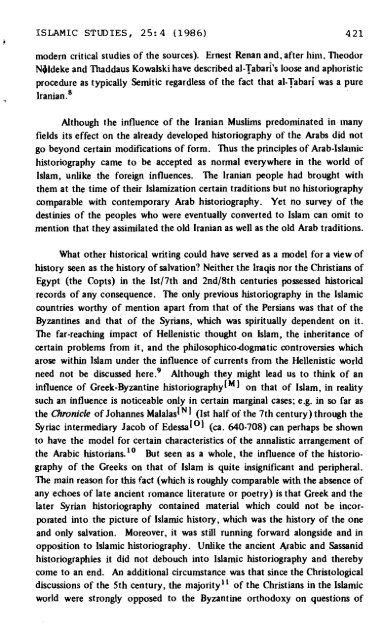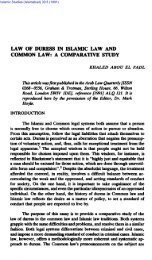ISLAMIC & WESTERN HISTORIOGRAPHY
ISLAMIC & WESTERN HISTORIOGRAPHY
ISLAMIC & WESTERN HISTORIOGRAPHY
Create successful ePaper yourself
Turn your PDF publications into a flip-book with our unique Google optimized e-Paper software.
0<br />
-.<br />
<strong>ISLAMIC</strong> STUDIES, 25:4 (1986)<br />
modern critical studies of the sources). Ernest Renan and. after liinl. Theodor<br />
Naldeke and Thaddaus Kowalski have described al-~abari's loose and aphoristic<br />
procedure as typically Semitic regardless of the fact that al-Tabari was a pure<br />
lranian.'<br />
Although the influence of the lranian Muslims predominated in many<br />
fields its effect on the already developed historiography of the Arabs did not<br />
go beyond certain modifications of form. Thus the principles of Arab-lslamic<br />
historiography came to be accepted as normal everywhere in the world of<br />
Islam, unlike the foreign influences. The lranian people had brought with<br />
them at the time of their Islamization certain traditions but no historiography<br />
comparable with contemporary Arab historiography. Yet no survey of the<br />
destinies of the peoples who were eventually converted to lslam can omit to<br />
mention that they assimilated the old lranian as well as the old Arab traditions.<br />
What other historical writing could have served as a model for a view of<br />
history seen as the history of salvation? Neither the lraqis nor the Christians of<br />
Egypt (the Copts) in the Istl7th and 2nd18th centuries possessed historical<br />
records of any consequence. The only previous historiography in the Islamic<br />
countries worthy of mention apart from that of the Persians was that of the<br />
Byzantines and that of the Syrians, which was spiritually dependent on it.<br />
llie far-reaching impact of Hellenistic thought on Islam, the inheritance of<br />
certain problems from it, and the philosophicodogmatic controversies which<br />
arose within lslam under the influence of currents from the Hellenistic world<br />
need not be discussed here.9 Although they might lead us to think of an<br />
influence of Creek-Byzantine historiographyIM) on that of Islam, in reality<br />
such an influence is noticeable only in certain marginal cases; e.g. in so far as<br />
the Chronicle of Johannes h4alalasIN1 (1st half of the 7th century) through the<br />
Syriac intermediary Jacob of ~dessaIOl (ca. 640-708) can perhaps be shown<br />
to have the model for certain characteristics of the annalistic arrangement of<br />
the Arabic historians.1° But seen as a whole, the influence of the historio-<br />
graphy of the Greeks on that of Islam is quite insignificant and peripheral.<br />
The main reason for this fact (which is roughly comparable with the absence of<br />
any echoes of late ancient romance literature or poetry) is that Creek and the<br />
later Syrian historiography contained material which could not be incor-<br />
porated into the picture of Islamic history, which was the history of the one<br />
and only salvation. Moreover, it was still running forward alongside and in<br />
opposition to lslamic historiography. Unlike the ancient &abic and Sassanid<br />
historiographies it did not debouch into lslamic historiography and thereby<br />
come to an end. An additional circumstance was that since the Christological<br />
discussions of the 5th century, the majority1' of the Christians in the lslamic<br />
world were strongly opposed to the Byzantine orthodoxy on questions of
















